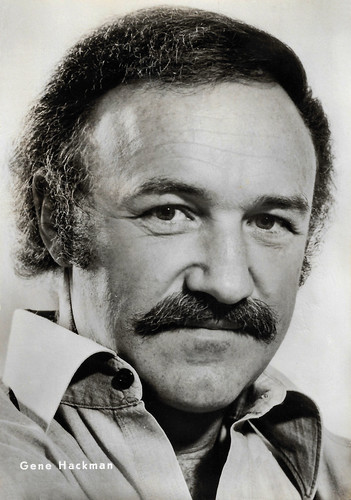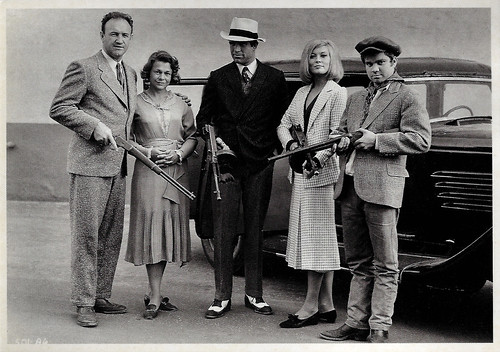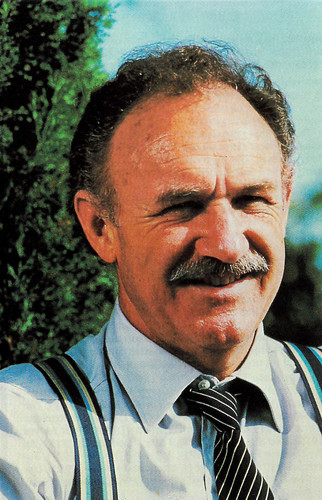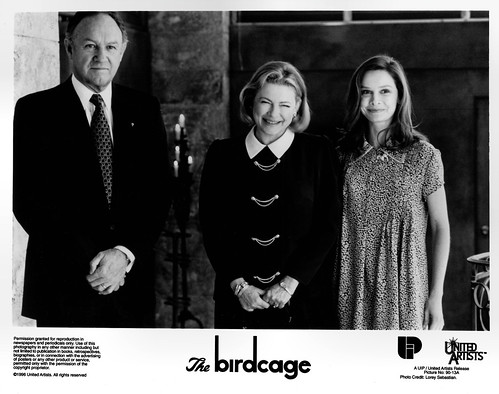
East German postcard by VEB Progress Film-Verleih, Berlin, no. 73/77.

West German collectors card by Kino.
Drop-out
Eugene Allen Hackman was born in San Bernardino, California, in 1930. He was the son of Anna Lyda Elizabeth (Gray) and Eugene Ezra Hackman, who operated a newspaper printing press. After several moves, his family settled in Danville, Illinois. As a child, he had to spend much time looking after his grandmother while his parents were at work.
Hackman was about 14 years old when his father walked out of the family, and Gene left home at sixteen for a hitch with the US Marines. Moving to New York after being discharged, he worked in several menial jobs before studying journalism and television production on the G.I. Bill at the University of Illinois.
Hackman would be over 30 years old when he finally decided to take his chance at acting by enrolling at the Pasadena Playhouse in California. Legend says that after flunking out of the Pasadena Playhouse after 3 months and moving to New York City with fellow drop-out Dustin Hoffman, Hackman worked at the Howard Johnson's restaurant in Times Square as a doorman. One day, a Pasadena Playhouse acting teacher whom Hackman hated walked by him, stopped, and told him that he had been right, that Hackman would never amount to anything.
Hackman worked in summer stock and off-Broadway. In 1964, he was cast as the young suitor in the Broadway play 'Any Wednesday'. This role would lead to him being cast in the small role of Norman in Lilith (Robert Rossen, 1964), starring Warren Beatty and Jean Seberg.
When Beatty was casting for Bonnie and Clyde (Arthur Penn, 1967), he cast Hackman as Buck Barrow, Clyde Barrow's brother. That role earned Hackman a nomination for the Academy Award for Best Supporting Actor, an award for which he would again be nominated in I Never Sang for My Father (Gilbert Cates, 1970).

Canadian postcard by Canadian Postcard, no. A-18. Photo: Columbia TriStar. Gene Hackman, Estelle Parsons, Warren Beatty, Faye Dunaway and Michael J. Pollard in Bonnie and Clyde (Arthur Penn, 1967).
A star at 40
In 1972, Gene Hackman won the Oscar for his role as Detective Jimmy "Popeye" Doyle in The French Connection (William Friedkin, 1971). At 40 years old, Hackman was a Hollywood star. He has stated that his performance in Scarecrow (Jerry Schatzberg, 1973) opposite Al Pacino is his personal favourite. The film was critically acclaimed but tanked at the box office.
He based his role in The Conversation (Francis Ford Coppola, 1974) on one of his uncles and a fellow Marine he had known well. Other successes were the crime drama Night Moves (Arthur Penn, 1975), the Western Bite the Bullit (Richard Brooks, 1975) about a 700-mile horse race and the sequel French Connection II (John Frankenheimer, 1975).
Hackman was a versatile actor who played the blind man in the comedy Young Frankenstein (Mel Brooks, 1974) and the evil Lex Luthor in Superman (Richard Donner, 1978) and Superman II (Richard Donner, Richard Lester, 1980).
In 1983, he scored a hit with Under Fire (Roger Spottiswoode, 1983) starring Nick Nolte. More successes followed, such as his high school basketball coach role in Hoosiers (David Anspaugh, 1986) with Barbara Hershey.
It culminated in 1988 when he starred in five films, including Another Woman (Woody Allen, 1988) with Gena Rowlands and Mississippi Burning (Alan Parker, 1988) with Willem Dafoe. For the latter film, he received another Oscar nomination.

Belgian postcard by Raider Bounty / Joepie. Gene Hackman in The French Connection (William Friedkin, 1971).
Not tired of Westerns at all
After initially turning down the role of the sadistic sheriff "Little" Bill Daggett in Clint Eastwood's Unforgiven (1992), Gene Hackman finally accepted it, as its different slant on the Western interested him. For his performance, he won the Oscar and Golden Globe and decided that he wasn't tired of Westerns after all. He appeared in Geronimo: An American Legend (Walter Hill, 1993), Wyatt Earp (Lawrence Kasdan, 1994), and The Quick and the Dead (Sam Raimi, 1995) with Sharon Stone. He appeared in three films adapted from novels by John Grisham: The Firm (Sydney Pollack, 1993) with Tom Cruise, as convict Sam Cayhall on death row in The Chamber (James Foley, 1996) and as jury consultant Rankin Fitch in Runaway Jury (Gary Fleder, 2003) with Dustin Hoffman.
Hackman played film director Harry Zimm in the comedy-drama Get Shorty (Barry Sonnenfeld, 1995) with John Travolta. He also played a submarine Captain on the edge of nuclear destruction in Crimson Tide (Tony Scott, 1995) alongside Denzel Washington, a conservative Senator in a dragqueen club in The Birdcage (Mike Nichols, 1996) and a doctor who puts his work above people in Extreme Measures (Michael Apted, 1996).
He played the president of the US in Absolute Power (Clint Eastwood, 1997) and co-starred with Will Smith in the political thriller Enemy of the State (Tony Scott, 1998), his character reminiscent of the one he had portrayed in The Conversation. One of the most sustaining actors of all time, he still averaged two films a year in his 70s, having starred in six in 2001 alone, including Wes Anderson's The Royal Tenenbaums (2001). However, this changed in 2004, when he last acted in Welcome to Mooseport (Donald Petrie, 2004).
In 2008, he announced his retirement from acting at the age of 78. In 2011, he released a novel, a violent Western, 'Payback at Morning Peak'. Another novel, 'Pursuit', a police thriller, followed in 2013. Gene Hackman was married for 30 years to Faye Maltese, with whom he has one son and two daughters: Christopher Allen, Elizabeth Jean, and Leslie Anne Hackman. The couple divorced in 1986. In 1991, Hackman married again, to classical pianist Betsy Arakawa.
On 26 February 2025, Gene Hackman, his wife, and one of their three dogs were found dead at their home in Santa Fe, New Mexico. Their bodies were found by maintenance workers who investigated after they found the front door of the property open. Hackman was found in the mudroom and Arakawa was found in the bathroom, and both showed signs of decay. Near Arakawa was an open prescription pill bottle with loose pills strewn about the floor. The next day, Santa Fe County Sheriff's Department said there were no significant signs of foul play, but did not initially provide time or cause of death. Later the same day, the sheriff told news media that the couple appeared to have died at least a day before their bodies were discovered. Police obtained a search warrant for the home to examine its "furniture, walls, plumbing equipment, [and] gas lines", attesting that while there were "no obvious signs of a gas leak" on first examination, the couple's sudden deaths were consistent with one, necessitating a "thorough investigation". An autopsy will be conducted on the bodies to determine cause and time of death.

Dutch collectors card. Gene Hackman in Misunderstood (Jerry Schatzberg, 1984).

Vintage press photo by UIP / United Artists, no. 90/13A. Photo: Lorey Sebastian. Gene Hackman, Dianne Wiest and Calista Flockhart in The Birdcage (Mike Nichols, 1996).
Sources: Tony Fontana (IMDb), Wikipedia (Dutch, German and English) and IMDb.
3 comments:
fiscal incorruptible, como el fiscal luque, javier escriva
fiscal incorruptible en testigo accidental 1990
La opinión del critico carlos boyero: es uno de mis actores favoritos. Siempre esta bien. Es un tio de verdad y sospecho que tambien es una persona cojonuda
Post a Comment